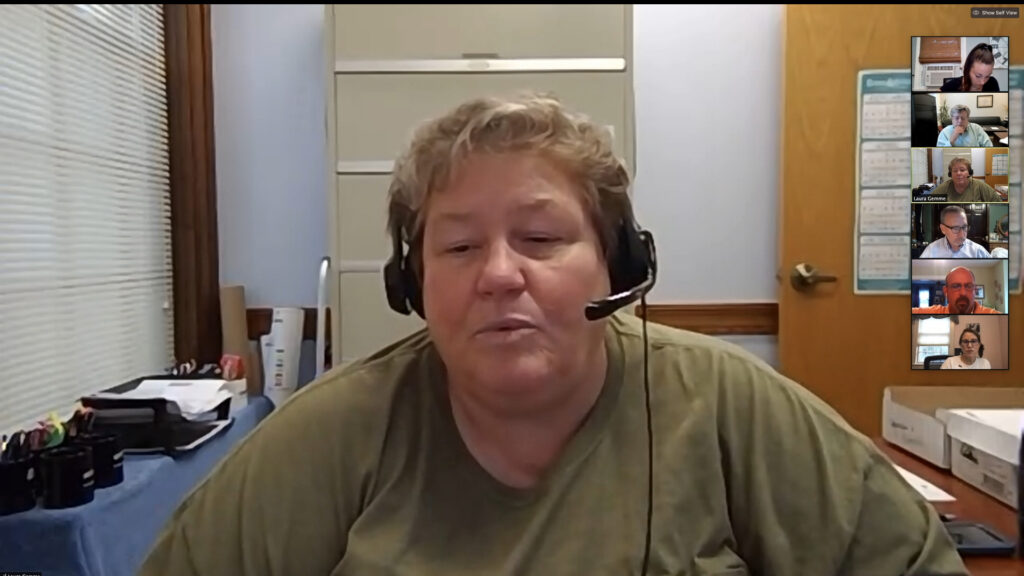
Reading, MA — Downtown parking issues were a primary point of concern for the Select Board on August 11. Community Development Director Julie Mercier reminded the board of possible actions that are being recommended by the Parking Transportation Traffic Task Force including making all “inner core” parking either thirty minute or two-hour parking, “outer core” parking being labeled for two-hour parking, or all-day for employees with permits, and the possible addition of paid parking kiosks in the two town-owned lots. The potential new regulations are designed to move employees away from prime spaces in order to open those spaces for customers. “Getting employees out of customer spots is what we need to do.” Select Board chair Mark Dockser affirmed.

“Parking management is a number one economic development priority.” Economic Development Director Erin Shaeffer continued. “We want to create parking turnover.” Board members asked questions regarding the number of employee parking passes, whether or not to continue to attach a fee for those passes, and concerns over the hoarding of passes by businesses.
There was also discussion regarding the cost of parking kiosks. “I cannot agree to [pursuing this now.]” member Vanessa Alvarado expressed. She also shared concerns that implementing kiosks could create a disincentive for people to bother shopping downtown. “On this topic, I’m open to discussion.” member Carlo Bacci shared. “This is part of a bigger picture,” Dockser affirmed that he likes the idea of kiosks possibly creating shorter visits and thus more parking turnover. “Less turnover, less dollars coming into the town.” Shaeffer declared.
The board also discussed the possibility of eliminating leased spaces and the expansion of spaces with electric vehicle charging stations. The Select Board will hold a public hearing on downtown parking on September 22.
Dockser also addressed an open meeting law (OML) complaint filed against the board on July 27. The complaint alleged four violations of open meeting law, a delay of February 11 meeting minutes being delivered to the town clerk, discussion regarding creating minutes that are not in compliance with OML, the timeliness of the approval of minutes, and that the July 22 retreat was not accessible to the entire community.
Dockser shared that he had been in contact with town counsel and with the office of the attorney general and had received guidance on the four issues. On the first complaint, Dockser shared that there is no requirement that minutes be submitted to the clerk, or that they are posted. He did share that it is a good practice to do so and to ensure that these events occur in a timely manner.
On the second complaint, after the consultation, Dockser believes that the board’s minutes are appropriate, though he did share that the Attorney General addressed the need to ensure that minority opinion is expressed through the minutes if there is disagreement on a topic.
Dockser expressed failure in regards to the third complaint and the timeliness of the approval of minutes. “We need to be more efficient and more timely [with minutes].” Dockser admitted. The Attorney General’s office shared with him that minutes need to be approved by the next three meetings, or thirty days, whichever is longer. “We have failed at this.” Dockser shared.
On the fourth complaint, Dockser reminded the board of the governor’s executive order allowing for online access as sufficient for the conduct of meetings during the pandemic. There is no law requiring broadcast or recording of the meetings. Dockser reminded the board that historically RCTV has not broadcast or recorded board retreats. He did admit, however, that placing a time limit on requests to join the meeting gave the impression that access was limited and that the advanced notice requirement to attend was a violation of OML.
Dockser asked members of the board to take time to attend online workshops regarding OML that are offered by the Attorney General’s office. The board voted 4-0 to direct town council to reply to the complaint.
“We are committed to remedying past violations and to complying with the law moving forward,” Dockser affirmed.
The board also was updated on the Dementia Friendly Reading Initiative by project manager Megan Putney. Putney shared regarding monthly leadership meetings as well as training that is available to businesses and town officials to become “dementia-friendly.” Several members of the board agreed to sign a document in support of the project as a step for Reading to be recognized as a dementia-friendly community.

The board voted 4-0 to close the warrant for both the state primary election and the local recall election on September 1. Eleanor Shonkoff, chair of the Board of Health, strongly encouraged Reading voters to vote by mail for all 2020 elections, including the presidential election in November. Town Clerk Laura Gemme informed the board that requests for mail-in ballots were being sent to voters this week. Gemme also shared that early voting will be available starting August 22 at the Reading Public Library. Poll workers for both elections are still needed.
The Select Board approved eleven different sets of minutes and adjourned at 11:00 pm.
